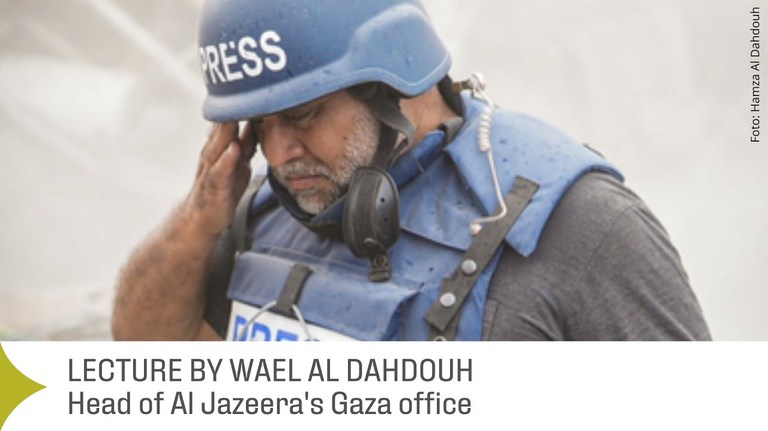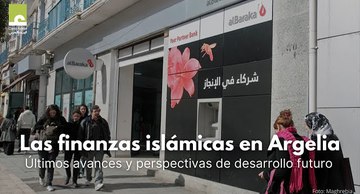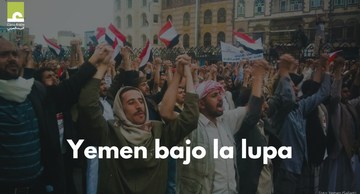

Lecture by the Gazan journalist Wael Al Dahdouh at Casa Árabe in Cordoba
Published at 16 04,,, 24 2024
ALL VIDEOS IN THIS CATEGORY
-
Vers l'autonomisation économique des femmes en Égypte, en Jordanie, au Maroc et en Tunisie
Le mercredi 24 février, nous vous proposons sur notre chaîne YouTube la présentation du rapport publié en novembre par l'OCDE sur les derniers changements juridiques produits dans ces pays pour faire tomber les barrières et faciliter le pouvoir économique des femmes. Si les femmes étaient autorisées à jouer le même rôle que les hommes sur le marché du travail, on estime que le PIB des pays du Moyen-Orient et d'Afrique du Nord pourrait être augmenté de 2,7 billions de dollars d'ici 2025. Compte tenu de la crise économique générée par la pandémie, et le recul qu'elle a engendré dans l'écart existant entre les sexes en termes de salaires, de compétences et de leadership, il est plus important que jamais de lever les barrières qui limitent encore la participation des femmes à l'économie pour matérialiser cet horizon. Malgré les défis auxquels certains pays doivent encore faire face pour garantir cet accès égal des femmes aux opportunités économiques, le dernier rapport de l'OCDE, publié en novembre, sous le titre «Changer les lois et éliminer les obstacles à l'autonomisation économique des femmes en Égypte , Jordanie, Maroc et Tunisie »(en anglais, arabe et français), met en évidence certaines des réformes législatives, politiques et institutionnelles introduites en Égypte, en Jordanie, au Maroc et en Tunisie pour soutenir l'autonomisation économique des femmes. Bien que des progrès soient en cours et que les facteurs de succès qui ont contribué à sécuriser les réformes soient identifiés, le rapport souligne qu'il est possible de les alimenter davantage grâce à des actions politiques ciblées, inclusives et coordonnées. À cet égard, il offre des exemples pratiques et des outils aux décideurs pour transformer les politiques en actions efficaces pour l'autonomisation économique des femmes. Pour présenter leurs résultats et propositions d'action, nous aurons la participation de Carlos Conde, directeur de la Division des relations mondiales Moyen-Orient et Afrique (OCDE), Soukaina Bouraoui, directrice exécutive du Centre des femmes arabes pour la formation et la recherche (CAWTAR) , Charlotte Goemans, analyste des politiques sur le genre et le développement à l'OCDE et l'un des principaux auteurs du rapport. L'événement sera présenté par Olivia Orozco, coordinatrice de Formation et Économie de Casa Árabe. Le rapport, publié le 10 novembre 2020, sur la base d'une précédente étude réalisée en 2017, est le résultat d'une collaboration entre l'OCDE, le CAWTAR et l'OIT et a été soutenu par de nombreux experts locaux, régionaux et internationaux. La présentation, organisée par Casa Árabe et l'OCDE, peut être suivie en direct le jeudi 24 février à 18h00 sur nos chaînes Twitter et YouTube. #debatescasaarabePublished at 46 18,,, 21 2021 -
Islamic Finance in Algeria: New developments and prospects
On Thursday, February 18, we offer this round table on our YouTube channel that will analyze the changes introduced over the last year by the government for the promotion of Islamic finance in Algeria, in the hands of experts and representatives of the banking sector in the country. In August 2020, Algeria’s National Bank officially launched its Islamic finance services. At the end of January this year, the Algerian government has just presented also a draft executive decree to regulate takaful (insurance services complying with Islamic Shariah law) business. These developments are part of a broader governmental policy to promote Islamic banking in the country. The declared objective is to integrate those sectors of the population still out of the banking sector and mobilize funds into the economic system from the informal market, which Algerian Central Bank estimates that may amount to $30 or $35 billion. According to the World Bank, only 42% of the Algerian population over 15-years-old has an account in a financial institution, a mere 29% made an active use of it and just a 2% made payments using a mobile phone or the internet (G20 Financial Inclusion Indicators Database, data of 2017). Some experts believe that Islamic banking could attract customers who refrain from operating with conventional banks due to religious considerations or to avoid lending or borrowing money with interest. Islamic banking in Algeria has been operating since 1991, when Al Baraka Group opened its branch there, Al Baraka d’Algérie, joined in 2008 by Al Salam Bank-Algeria. However, till recently it has remained a small niche of the banking industry. Mobilizing those funds could introduce liquidity and ease the socioeconomic situation in the country, in a context of low oil prices and economic crisis exacerbated by the Pandemics. The roundtable, organized in the framework of the SCIEF-Casa Árabe Observatory of Islamic Finance in Spain, will analyze the new changes and regulation put into place into the Algerian banking system to identify the challenges and perspectives for the development of the industry in the country. Program 10:30 Roundtable Fatiha Talahite, Senior Researcher with the CNRS and Member of Cresppa-GTM (Centre de Recherches Sociologiques et Politiques), Paris Mohamed Boudjellal, Professor of Economics, Université de M’Sila, Algeria Zakaria Slimani, Assistant to the General Manager, Bank Al Baraka of Algeria Abdelhafid Benamraoui, Principal Lecturer in Finance, University of Westminster, London Moderator: Olivia Orozco, Education and Economics Coordinator, Casa Árabe 11:45 Debate with members of the Observatory and participants First reaction: Gonzalo Rodríguez, General Coordinator, SCIEF More information: https://en.casaarabe.es/event/islamic-finance-in-algeria-new-developments-and-prospects Photo: Maghrebia. 110414 Algerians seek expanded Islamic banking optionsPublished at 58 12,,, 21 2021 -
Yemen under the magnifying glass
On Tuesday, January 12, we will be giving this conference in collaboration with the Center for Strategic Studies of Sanaa. You can watch it live on our Youtube channel. Yemenis are already facing what the UN has classified as the world’s worst humanitarian crisis, and everything indicates that their suffering will only increase as more local communities are forced to take sides. Given the ongoing lack of an agreement, and with the forces of the so-called Arab Coalition (Saudi Arabia and the United Arab Emirates) greatly reduced, local role-players are now positioning themselves for war on behalf of their external sponsors. After six years of armed conflict, the country has split at least three ways: the Houthis in the north fighting the Abu Dhabi-backed secessionists, and the weak government of Abdrabbo Mansur Hadi in the east with support from Riyadh. The influx of money and weapons from regional actors will lead to further polarization. And, by turning the conflict into a full-fledged proxy war, the states that once formed the Arab Coalition will be able to shirk their responsibility in providing reparations and assistance to rebuild the country. Sidestepped in international headlines, the country deserves an in-depth analysis of the past and the interference that has led it to this alarming situation, and of the uncertain future of its people. Casa Árabe and the Center for Strategic Studies of Sanaa are organizing this round table with Farea Al-Muslimi, director and co-founder of the center, Ghaithaa Alrashidy, a researcher and visual data specialist at the same think-tank, and journalist Natalia Sancha, a contributor to El País, who provided special coverage of Yemen in late 2020. Presented by Karim Hauser, Casa Árabe’s Coordinator of International Relations. Farea Al-Muslimi is the director and co-founder of the Center for Strategic Studies in Sanaa. He is also an associate member of Chatham House. Prior to that, he worked for the Carnegie Middle East Center in Beirut and the Middle East Institute in Washington, D.C. as a visiting scholar, where he covered Yemen and the Gulf. In August 2016, UN Secretary-General Ban-Ki Moon appointed Al-Muslimi to become a member of the Advisory Panel of Experts for the Study of Progress on Youth, Peace and Security, a study mandated by Security Council Resolution 2250 to examine the positive contribution of youths to peace processes, conflict resolution and effective responses at the local, national, regional and international levels. Al-Muslimi’s publications on Yemen and the region have appeared in Foreign Affairs, Foreign Policy, New York Times, The National, The Independent, The Guardian, Al-Hayyat, Assafir Arabi, Al-Monitor and other publications. Natalia Sancha is an independent journalist and photographer who specializes in the Arab world. She has been living in Lebanon since 2008. Since 2011, she has covered the wave of popular protests in the Middle East and the later conflicts in countries such as Egypt, Yemen, Lebanon and Syria, as well as the resulting flow of refugees and their impact on the region. She also contributes to the Spanish daily newspaper El País, for Lebanon and Syria, and publishes analyses on regional politics in Esglobal and Política Exterior. She co-authored the book Siria. La primavera marchita (Syria: The wilted spring). She earned her Master’s degree in Contemporary Arab Studies at Georgetown University as a Fulbright scholar, and was a finalist for the Cirilo Rodríguez Award in both 2018 and 2019. Ghaidaa Alrashidy is a researcher and a visual data specialist with the Sana’a Center for Strategic Studies. Her research focuses on southern Yemen, and security and social issues in southern governorates. She is also a co-presenter on Dunyana, a weekly TV show on BBC Arabic that deals with issues pertinent to women in the Arab world.Alrashidy has worked for almost a decade in development programs with various international organizations, including the International Organization for Migration, Mercy Corps and Responsive Governance Project (USAID). Alrashidy holds a BS in architecture and a diploma in gender studies from the University of Aden. She is currently a master’s candidate in Urbanism at the Lebanese University in Beirut. More information : https://en.casaarabe.es/event/yemen-under-the-magnifying-glass IMAGES: IMG1. Ibrahim Qasim. Air strike in Sana'a 11-5-2015 IMG2. Felton Davis. Starvation in Yemen IMG3. Julien Harneis. WFP food distibution in Raymah IMG4. Julien Harneis. Solar panels for cold chain on Raymah health centre IMG5. Felton Davis. Pulverized Yemen IMG6. Felton Davis. Yemeni ChidlrenPublished at 57 12,,, 21 2021 -
The US in the Middle East and North Africa: A change in command (ENGLISH)
On Monday, November 23, Casa Árabe is bringing together four analysts to debate Trump’s legacy in the Middle East and North Africa, and the changes which may be ushered in by the upcoming Biden Administration in that region. You can watch it love on our Youtube channel. The Trump era is drawing to a close, and with it ends a way of wielding power. As a new team gets ready to enter the White House in January 2021, it appears as though the transition will be quite difficult. The United States’ foreign policy continues to have a crucial impact on the Middle East, the Gulf and North Africa. Many questions have arisen about the main guidelines to be followed by the president-elect, Joe Biden, with regard to these countries and the leeway he will have to maneuver with them. In attempting to reveal some of the essential factors at play, Casa Árabe is bringing together four analysts to debate Donald Trump’s legacy in the Middle East and North Africa, and the changes which may be ushered in by the upcoming Biden Administration. Rami Khouri is a professor of Journalism at the American University in Beirut and a senior fellow at Harvard’s Kennedy School. Intissar Fakir publishes the news bulletin Sadaof the Carnegie Endowment for International Peace. Haizam Amirah Fernández is the Head Researcher on the Mediterranean and Arab World at the Real Instituto Elcano. Ali Fathollah-Nejad is a researcher with the Afro–Middle East Centre (AMEC). The event will be moderated by Karim Hauser, Casa Árabe’s International Relations Coordinator.Published at 07 20,,, 20 2020 -
Aula Árabe Universitaria: El teatro escrito en árabe marroquí: historia y presente
Segunda conferencia del programa Aula Árabe Universitaria 2, a cargo Omar Fertat, investigador de teatro y profesor de la Universidad Bordeaux-Montaigne. (En ESPAÑOL y FRANCÉS). En sus comienzos, el teatro marroquí, animado principalmente por jóvenes procedentes de movimientos nacionalistas y reformistas, adoptó como idioma el árabe clásico o literario. Sin embargo, rápidamente el dariya, o dialecto árabe marroquí, será adoptada gradualmente por los dramaturgos marroquíes hasta convertirse, desde la década de los años cincuenta del pasado siglo, en el idioma principal del cuarto arte en Marruecos. La conferencia, a cargo del investigador de teatro y profesor de la Universidad Bordeaux-Montaigne, Omar Fertat, ofrecerá una panorámica del uso del dariya en el teatro marroquí examinando los momentos más importantes del proceso mencionado y destacando las experiencias más llamativas de algunos dramaturgos, que no sólo han utilizado esta lengua como medio de comunicación, sino que la han consagrado definitivamente como medio de expresión artística y literaria. A su vez, el profesor Fertat profundizará sobre las experiencias contemporáneas de jóvenes dramaturgos marroquíes que se han distinguido en los escenarios árabes y marroquíes al utilizar el dariya como lengua principal en sus obras. Presentan y moderan el encuentro Karim Hauser, coordinador de Relaciones Internacionales de Casa Árabe, y Adil Moustaoui, profesor en el Grado de Lenguas Modernas y sus Literaturas de la UCM. Casa Árabe organiza esta segunda conferencia del programa Aula Árabe Universitaria 2 (AAU2) en colaboración con el Grado de Lenguas Modernas y sus Literaturas, opción árabe como lengua maior, de la Universidad Complutense de Madrid (UCM). Los estudiantes de dicho programa y del resto de programas universitarios asociados o colaboradores con Aula Árabe Universitaria, podrán conectarse en directo por videoconferencia. El resto del público podrá acceder a ella posteriormente. Omar Fertat Es investigador de teatro y profesor de la Universidad de Bordeaux-Montaigne, donde imparte clases de cine y teatro árabe en el departamento de Estudios Árabes y en el departamento de Artes Escénicas. Allí también supervisa el programa científico "L'Autre et ses représentations dans la culture arabo-musulmane" en el centro de investigación TELEM y codirige la colección "Monde Arabe / Monde Musulman" de la Editorial de dicha universidad. Es director además de "Encuentros universitarios sobre las artes escénicas en el mundo árabe" que tiene lugar en Burdeos cada dos años, y administra la revista de teatro francesa "Horizons / Théâtre". Su investigación se centra en el teatro árabe en general y más particularmente en el teatro marroquí. También está interesado en temas relacionados con la traducción y la adaptación en el teatro árabe, así como las formas modernas y contemporáneas de las artes escénicas en el mundo árabe. Entre sus últimas publicaciones cabe destacar "L’Autre et ses représentations dans la culture arabo-muslmane" (coeditor, 2016); "Le théâtre marocain à l’épreuve du texte étranger: traduction, adaptation, nouvelle dramaturgie" (2017) y "L' adaptation dans le théâtre marocain: des débuts jusqu'à nos jours" (2020). Grado de Lenguas Modernas y sus Literaturas (UCM) La existencia en la UCM de las filologías modernas cuenta ya con más de medio siglo. Fue creada en el año 1954 con el nombre de Sección de Filología Moderna, junto a las secciones ya existentes de Filología Románica, Clásica y Semítica de la Facultad de Filosofía y Letras. Esta Sección de Filología Moderna a su vez se dividía en cuatro subsecciones: Alemana, Francesa, Inglesa e Italiana. En 1975, con la creación del Espacio Europeo de Educación Superior se sustituyen los anteriores planes de licenciatura en Filología Alemana, Filología Francesa, Filología Italiana y Filología Románica y Filología Eslava por el Grado en Lenguas Modernas y sus Literaturas. Este Grado, basado en las antiguas filologías, se diseña bajo un enfoque plurilingüe y un nuevo modelo estructural Maior-Minor, según el cual se establece una formación en una primera lengua y su literatura (2/3 aprox. del total de ECTs de la Titulación), que deberá combinarse obligatoriamente con una segunda lengua y su literatura (1/3 aprox. del total de los créditos de la Titulación). Más información: https://www.casaarabe.es/eventos-arabes/show/nueva-edicion-de-aula-arabe-universitaria#14875Published at 41 12,,, 20 2020





